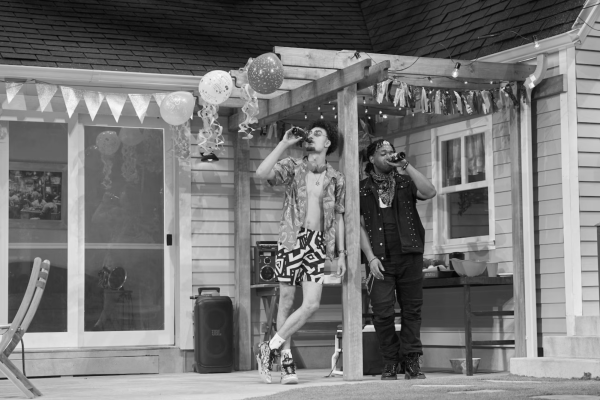Bollywood Film Gets “Ugly” at Apollo
Editor’s Note: This film and article contain mentions and instances of violence, third-degree torture, police brutality, suicide, rape of a minor, sex-trafficking, and molestation.
This article contains spoilers for the film Ugly.
Anurag Kashyap’s Ugly takes the audience past the veneer of Bollywood stereotypes, opening a window into the lives of lower middle-class India. Ugly is — what my mother says with a derisive snort — an “artsy” film. That is to say, the film is not the famed, mainstream Bollywood flick that most Indians, non-resident Indians, and non-Indians have come to love and celebrate. No characters bursting into song and dance; no colorful costumes or picturesque cinematography, and not an ounce of glamor. Ugly is indeed ugly, but it casts a necessary light on the safety of women, the Indian justice system, and the psyche of poor and unsuccessful individuals.
Today, Ugly will become one of the first Bollywood movies screened in Oberlin at 7 p.m. at the Apollo Theatre. It is a free screening courtesy of guest speaker Ranjani Mazumdar, a Professor of Cinema Studies at the School of Arts and Aesthetics, Jawaharlal Nehru University.
Mazumdar arrived in Oberlin yesterday to give a talk titled “Public Talk: Cinematic Bombay — Contingency, Crisis, and Decay” about the contemporary transformation of the city of Bombay through three films: Ritesh Batra’s Lunchbox, Vikramaditya Motwane’s Trapped, and Ugly. Bombay is the previous name of the city, which has been called Mumbai since 1995.
“It was really interesting to learn about the specific themes and technical approaches of films which aren’t really mainstream Bollywood, but aren’t exactly arthouse films meant for a niche audience,” College junior Priyanka Sen wrote to the Review. “I think the talk gave us a sense of an emerging, exciting type of Indian cinema which tell difficult stories in a unique way.”
Ugly is set in Mumbai, and revolves around the kidnapping and subsequent search for 10-year-old Kali (Anshika Shrivastava). Parents and police, both with questionable morals, highlight issues of sex, money, crime, debauchery, and deceit. Overall, the film showcases how ugly human beings truly are, as greed and self-interest preclude saving an innocent life.
The director of Black Friday, Dev. D, and Gangs of Wasseypur, Kashyap is acclaimed for his ability to capture the common man, woman, and family of India. Ugly premiered at the 2013 Cannes Film Festival, and was screened at the New York Indian Film Festival in 2014, the third Ladakh International Film Festival, and the Indian Film Festival of Los Angeles. While on a considerably lower budget compared to masala films that year such as Rohit Shetty’s Singham Returns and Sabbir Khan’s Heropanti, Ugly has been critically acclaimed and a box office success.
“When it comes to portraying ‘the dark’ in Bollywood, writers and directors have to find a way of humanizing the ‘dark’ genre without romanticizing it,” College sophomore Lyala Naomi Khan wrote in an email to the Review. “Anurag Kashyap’s work, in my experience, has been hit-or-miss in this regard — succeeding, with Black Friday and Masaan, but failing to strike the right balance in Bombay Velvet, for example.”
One of the most appalling concepts in the film is a reference to the sex-trafficking of young girls. One of the police personnel investigating the case, Inspector Jadhav (Girish Kulkarni) insinuates that Kali must have survived, citing the fact that she is pretty. What’s worse, however, is when ACP Upadhyay, a female Assistant Commissioner of Police (Madhavi Singh) attempts to deduce the ethnicity of the kidnapper or buyer by the “common preferences” of the Indian population. She says Indians target fair-skinned, beautiful children, whereas brown children are preferred by foreigners. It is one of the only allusions in the film, and one of the few in Hindi cinema, to the racism perpetuated in Indian society — not just between foreigners and Indians, but amongst Indian people themselves.
Rather than using sweeping shots of Mumbai skylines, Kashyap dives into the grime of suburban Mumbai, taking the audience into slum-dwelling, matchbox apartments and railway stations, often using hidden cameras to circumvent crowds, according to Entertainment Times. The Times of India also cites Kashyap as saying, “It is my most brutally honest film and I did it exactly the way I wanted to. It’s a dark, emotional roller coaster and there is no way it won’t work!”
Ugly also presents a stunningly real visualisation of housewives in India through the character of Kali’s mother, Shalini (Tejaswini Kolhapure). Rather than a perky 20-something who wears designer clothes and is touched-up beyond recognition, the film showcases a lonely, helpless older woman. Shalini struggles to stay in touch with her youth, has an affair, is borderline alcoholic, and is trapped in a home with a paranoid second husband. Kashyap, however, doesn’t keep Shalini a powerless damsel. Shalini has an affair with her first husband’s best friend, shoots her second husband in the shoulder, and deceives her parents into giving her $1.8 million. Kashyap’s female characters desire sex, steal money, attempt suicide, and are unnervingly calm in the face of horrific violence. While disturbing, the film creates a dark power in the women it features.
“Kashyap’s female characters are never just victims, but have their own agency,” Mazumdar wrote in an email to the Review. “The same is the case with Shalini’s character in the film. Yet, she is also trying craft her way out of her situation. She is neither just victim nor only a crafty woman. She remains a complex character.”
It is likely that some Indians would criticize Ugly reaching theaters abroad, expecting it to reflect poorly on India.
“I have no anxiety about this,” Mazumdar wrote. “No part of the world is without problems and India has its own share. We need to critically engage with what goes on in India, not defend it abroad. This is what diplomats and nationalists do. Our job should be to critically engage with the world we live in, not look for idealised images that can help us brush over the complex realities of the country.”









